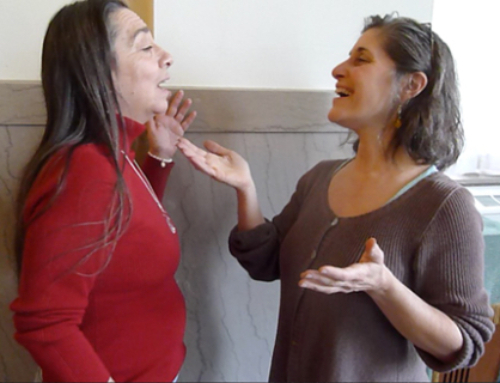This is an excerpt from the LAST CHAPTER of my book, The Fear of Singing Breakthrough Program: Learn to Sing Even if You Think You Can’t Carry a Tune.
You may not be quite there yet, but don’t worry – you can be – just give yourself time and compassion!
Singing with other people doesn’t need to be high stress.
It’s a mistake to think of it as a culmination of your singing efforts; instead think of every occasion to sing with other people as an opportunity to practice.
Each time will be different and some times will be more fun than others. When it’s less fun, don’t succumb to old feelings of shame, but rather turn towards curiosity and see what you can learn.
Show yourself some appreciation for your courage. Acknowledge that even though the people around you might not know it, the fact that you’re singing with them is an accomplishment!
Bring a Resilient Attitude to Deal with a Worst Case Scenario
If you have a rough singing history, you may find that your old traumas return to some extent when you first start taking your new singing skills out on the road.
You might find yourself singing off-key, getting some funny looks from people, or even just not getting the positive feedback you were hoping for. Even the vacuum created by people saying nothing can make you feel criticized. This is not a signal to give up!
Even if the situation is seemingly casual or relaxed, it may trigger some of your old reactions. You might find yourself shaking, thinking negative thoughts, feeling self-conscious or embarrassed, or experiencing any number of the symptoms of fear.
Although you know that your skills have been improving, you may still be very sensitive about how people respond to you when you sing. Knowing that this is normal and that it will pass is comforting. Use your techniques from Chapters 8 and 9. Work with yourself to let embarrassment be just embarrassment — remind yourself that you do not have to move into the realm of shame.
Shame says, “You are not worthy. You are alone.”
Embarrassment says, “This is awkward but it will pass. Everyone feels this way sometimes.”
You can expect to feel a little embarrassment now and then, and you can handle it. Let it go as fast as you can and line up your next opportunity speedy-quick so you don’t get stuck. You’ll start to experience less and less embarrassment and begin having more and more fun.
Choose Opportunities That Suit YOU!
How do know what opportunities are right for you?
You might be tempted to decline opportunities that arise feeling that you’re not ready, so think now about setting intentions so that you won’t succumb to panic and decline automatically. Don’t let “no” be your default response.
Imagine that a friend of yours invites you to a Karaoke party.
Do you want to go? If so, do you want to sing, or just watch?
Standing up and singing in front of a group of people might be more than you want to do at this point. This opportunity, cool as it might sound, might not be in sync with where you are right now.
If it’s too much of a trigger of stage fright for you, saying no might be a good choice.
While you’re not allowing no to be your default, you don’t have to say yes to everything. Try not to be on automatic pilot with your answers.
Check in with yourself; question your first impulse and think it through. If you’ve thought about it and decided that you’re not ready and your answer is no, that’s perfectly fine.
On the other hand, perhaps you know that the crowd you’d be with is going is very supportive and that this opportunity, though a stretch, might be a good one. Go with your gut. Trust yourself, but make sure that part of the deal is that if you don’t like what happens, you move right on and try something else.
Here’s another scenario: You’re at a Christmas party and people start singing carols. Your first impulse is to feel kind of left out as you have in the past. Then you think, “This is an opportunity!” You try humming along, but there’s only one song you know well enough to really sing along with and they’re not singing it.
You’re not confident enough yet to lead this song but you realize that if you ask the group someone there will probably know it. So you go ahead and ask, and pretty soon they’re singing that song and you’re singing too, and it’s really fun and satisfying. Good job!
Another scenario: You’re planning your son’s birthday party and you know that everyone will expect the Happy Birthday Song at cake time. Usually you dread this but now you have a plan.
You’ve been practicing and you know that you like to sing it pretty low, so instead of waiting for someone else to start it, you’re going to take charge by getting the song started.
You’ll sing the first two syllables of the song (Hap-py…) loud and slow, so that everyone joins in at your pitch. You know that momentum will take over from there so you can just relax and let the rest of the song happen. You’re proud that you actually got the song going — that was a big step for you. And you’re happy that you could easily sing along because it was pitched in a comfortable key for you. Success!
Think about what opportunities are coming up and which ones you can create for yourself. What feels like too much? What sounds like fun?
Does singing a song to your grandchild sound scarier or less scary than singing in a chorus?
Start with what seems most comfortable and move gradually into opportunities that are more challenging.
If you were to pick three activities, which would you prefer to come first, second and third? Jot down a few ideas and then turn on your radar for what comes your way.
Join the Fearless Singers Playground online membership program — a supportive and joyous singing community specially designed for beginners! When you join you’ll get access to great online skills & song lessons, as well as live sing-alongs, workshops, and open mics.
Such a great way to grow as a singer!







Leave A Comment